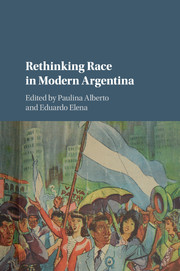Book contents
- Frontmatter
- Contents
- List of figures
- List of tables
- Notes on the contributors
- Preface
- Introduction: The shades of the nation
- PART I HISTORIES OF RACE IN THE TWENTIETH CENTURY
- 1 Insecure whiteness: Jews between civilization and barbarism, 1880s–1940s
- 2 People as landscape: The representation of the criollo Interior in early tourist literature in Argentina, 1920–30
- 3 Black in Buenos Aires: The transnational career of Oscar Alemán
- 4 La cocina criolla: A history of food and race in twentieth-century Argentina
- 5 “Invisible Indians,” “degenerate descendants”: Idiosyncrasies of mestizaje in Southern Patagonia
- 6 Race and class through the visual culture of Peronism
- 7 Argentina in black and white: Race, Peronism, and the color of politics, 1940s to the present
- PART II RACE AND NATION IN THE NEW CENTURY
- Epilogue: Whiteness and its discontents
- Collective bibliography
- Index
1 - Insecure whiteness: Jews between civilization and barbarism, 1880s–1940s
from PART I - HISTORIES OF RACE IN THE TWENTIETH CENTURY
Published online by Cambridge University Press: 05 March 2016
- Frontmatter
- Contents
- List of figures
- List of tables
- Notes on the contributors
- Preface
- Introduction: The shades of the nation
- PART I HISTORIES OF RACE IN THE TWENTIETH CENTURY
- 1 Insecure whiteness: Jews between civilization and barbarism, 1880s–1940s
- 2 People as landscape: The representation of the criollo Interior in early tourist literature in Argentina, 1920–30
- 3 Black in Buenos Aires: The transnational career of Oscar Alemán
- 4 La cocina criolla: A history of food and race in twentieth-century Argentina
- 5 “Invisible Indians,” “degenerate descendants”: Idiosyncrasies of mestizaje in Southern Patagonia
- 6 Race and class through the visual culture of Peronism
- 7 Argentina in black and white: Race, Peronism, and the color of politics, 1940s to the present
- PART II RACE AND NATION IN THE NEW CENTURY
- Epilogue: Whiteness and its discontents
- Collective bibliography
- Index
Summary
With its large percentage of inhabitants descended from European immigrants, Argentina has not had as obvious a racial Other as such Latin American countries as Brazil or Mexico. Scholars have begun to examine in detail Argentine notions of blackness – sometimes identified with persons of African ancestry, more often with mestizos from the Interior, and frequently with poor people of varied backgrounds – and how they have changed over time. Yet the construction of whiteness is equally deserving of attention. The prevailing historical narrative contends that before the advent of Peronism, “the nation had been constructed as homogeneously white.” It also suggests that Argentines viewed immigrants from Europe and the circum-Mediterranean region as uniformly white. My research indicates that this was not necessarily the case for Jews, whose whiteness was suspect despite their European and Mediterranean origins. How can one conceptualize the racial constructions of Jews, whom Argentines rarely described in explicitly phenotypical terms, yet sometimes seemed to regard as a race apart? How did Jews assert their whiteness? The reflections of two famous literary figures, Manuel Gálvez and Leopoldo Lugones, provide initial clues.
In the early 1900s, an unruly gathering of Eastern European Jews shocked Manuel Gálvez. Aware of his research on the white slave trade, a Jewish antiprostitution organization had invited him to serve on its board, and he and other leaders sat on the stage at the inaugural meeting. According to the young writer, the many poverty-stricken people in the audience moved about “as if possessed by a sickly nervousness,” joking, murmuring, scolding each other, their babies shrieking at their mothers’ breasts. Apparently incited by one of the speakers, the ill-smelling crowd turned into a “jungle of arms that waved in a threatening manner, the faces congested with fury,” as many screamed insults, shook their fists, and emitted ever more sour odors. The board members fled the auditorium when the throng began to throw chairs and other objects at them. “In my life I have never attended such a monstrous scandal,” Gálvez claimed many years later. He believed that traffickers had hired the mob to break up the gathering. Whether these people received payment or not, the author regarded them as uncontrollable animals, as observers often have depicted people of color.
- Type
- Chapter
- Information
- Rethinking Race in Modern Argentina , pp. 25 - 52Publisher: Cambridge University PressPrint publication year: 2016
- 1
- Cited by



